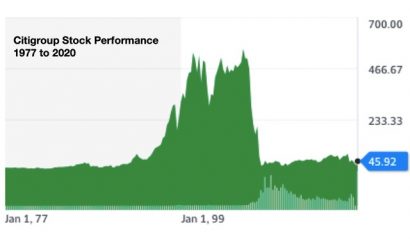
Jane Fraser was selected to be the next CEO of Citigroup, the first woman to run a “money center” bank. One can only hope that she will best the performance of her predecessors. Aside from a decade of irrational exuberance in the price of Citigroup shares (see graph below) any time frame in which one might evaluate them, year to date, one year, five years, or say 25 years, the performance is abysmal.
And let’s not forget, Citigroup was a stock that was trading at $557 before the Great Recession. At today’s price of about $50, the leadership prior to Ms. Fraser’s ascent lost more than 90% of the value once held by shareholders.

As an aside, the current ~$50-ish price was the by-product a reverse split in 2011. With the price of its shares trading at less than $5 at the time, the house of Citigroup had been reduced to a penny stock at the hands of its guardians.
While this is a stunning track record of incompetence, there are ways to look at it which can increase the level astonishment.
The bow-tied investment bankers of Citigroup counsel businesses on mergers, acquisitions, divestitures, overseas tax schemes, special purpose vehicles, securitizations, all for the express purpose of creating shareholder value, yet none of this expertise was on tap in the executive suite?
Citigroup analysts cover banks and recommend to investors which ones to buy and which ones to sell but none of their analysis was held up to the mirror for self reflection? Parenthetically, what does this say about masters-of-the-universe portfolio managers who took advice from an institution that could not manage their own bank?
The leaders of Citigroup were all money men. There were no hard assets or unionized workers or scientific breakthroughs and all the nettling challenges they bring. The assets, the liabilities, the inventory were all made of money — nothing outside of their comfort zone — in a business that dates back in millennia, but they still managed to lose 90% of it?
Finally, at today’s prices, Citigroup stock is trading at about the same price it was in 1993. Asked to finance a business with such a miserable track record, Citigroup bankers would have surely demurred.
At its core, banking is a rather simple spread business: you lend money out at a multiple of what you borrow for from depositors or other lenders. But it’s not simple when proprietary trading, insurance, structured credit operations, investment banking and who knows what else are added on a global scale. Analysts I talked to back in the day said they were scared to death of Citigroup’ balance sheet. “There’s no way of telling what’s really in there,” they said.
And perhaps this is the nib of it when it comes to the appointment of Ms. Fraser. All who preceded her were empire builders and conquerors, and apparently pillagers too. Perhaps Ms. Fraser can bring to the table some qualities that appear long forgotten at Citigroup. Qualities such as being empathetic, sensitive, humble, collaborative and dare I say it, nurturing? Nurturing, of course, is a bit of a charged word in these charged times.
But in the case of Citigroup, it’s apt. Had its prior leaders, all men, more carefully nurtured the business under their care, they might not have lost nearly all of it.


